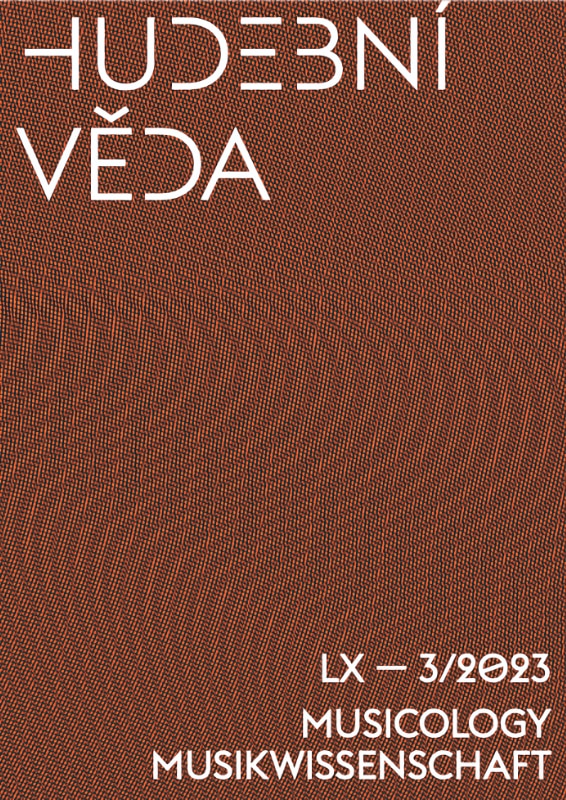Článek | Article
Autor:
Štěpán Hurník
Název:
Hudební význam jako metaforická exprese. Studie ke Scrutonově pojetí hudebního významu
Variantní název:
The Meaning of Music as a Metaphoric Expression. A Study on Scruton’s Approach to the Meaning of Music
Zdrojový dokument:
Hudební věda LX (2023), č. 3, s. 376–397.
DOI:
https://doi.org/10.54759/MUSICOLOGY-2023-0304
Trvalý odkaz:
https://kramerius.lib.cas.cz/uuid/uuid:f0c951b2-8ca6-4301-99e6-c22cc5c47327
České resumé:
Roger Scruton ve svém hudebně estetickém díle přichází s nosnou koncepcí hudebního významu, kterou je třeba vnímat jako filosoficky udržitelnou alternativu vůči sémiotickým teoriím hudebního znamenání. Studie se pokouší překonat problematické postavení Scrutonovy teorie, v níž absentuje systematicky vyčerpávající pojednání o tématu hudebního významu, a prostřednictvím rozborů Scrutonových hudebně estetických textů nabízí definici Scrutonova pojetí hudebního významu. Za tímto účelem studie využívá dva metodologické postupy, jejichž prostřednictvím odhaluje základní rysy Scrutonovy koncepce. Prvním z nich je rekonstrukce Scrutonovy kritiky hudební sémiotiky. Hudební význam se tu ukazuje jako metaforický fenomén, jejž posluchač nekonceptuálně zachycuje v díle samotném. Druhým je výklad Scrutonova pojetí hudební zkušenosti. Tato zkušenost je specifickým případem zkušenosti estetické a vyznačuje pole posluchačova hudebního porozumění znějícímu hudebnímu dílu. Hudební význam je zde představen coby předmět posluchačova hudebního porozumění, jehož konstituce spočívá na metaforicko-intencionální procesualitě hudebně-estetické zkušenosti. Prostřednictvím těchto poznatků studie dospívá k závěru, že hudební význam je metaforickou expresí, která posluchače v momentě jeho estetického kontaktu s dílem nekonceptuálně upomíná na základní aspekty jeho vlastní existence.
English summary:
In his treatment of the aesthetics of music, Roger Scruton offers a relevant concept of the meaning of music, one which amounts to a philosophically tenable alternative to the semiotic theories of musical semantics. This study aims at surmounting the problematic status of Scruton’s theory with its lack of a systematic, exhaustive approach to the subject of musical meaning, and through analysis of Scruton’s musical-aesthetic texts draws up a definition of Scruton’s approach to the meaning of music. To achieve this, the present text employs two methodological procedures making it possible to reveal the key characteristics of Scruton’s approach. The first of these consists in a reconstruction of Scruton’s critique of the semiotics of music. There, the meaning of music emerges as a metaphorical phenomenon which is perceived by the listener in a work of music per se. The second characteristic relates to Scruton’s approach to musical experience. This is understood to be a specific case of aesthetic experience, which delineates the field of the listener’s musical understanding of a performed work of music. Here, the meaning of music is presented as the object of the listener’s musical understanding, whose constitution is based on the metaphoric and intentional processuality of the aesthetic experience of music. These observations lead the author to the conclusion that the meaning of music is a quality of metaphorical expression by which the listener gets a non-conceptual reminder, at the moment of their aesthetic contact with a work of music, of crucial aspects of their own existence.
Klíčová slova:
estetická zkušenost; exprese; hudební význam; metafora; Roger Scruton; sémantika; sémiotika; pohyb; představivost; znak
Keywords:
aesthetic experience; expression; meaning of music; metaphor; Roger Scruton; semantics; semiotics; movement; sign

